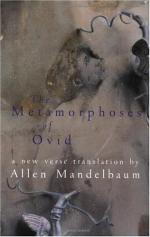|
|
Metamorphoses Notes & Analysis
The free Metamorphoses notes include comprehensive information and analysis to help you understand the book. These free notes consist of about 82 pages (24,309 words) and contain the following sections:
These free notes also contain Quotes and Themes & Topics on Metamorphoses by Ovid.
Metamorphoses Plot Summary
Metamorphoses is a collection of ancient stories of mythology written in poem form. Each of the stories that Ovid presents contains some sort of transformation, or metamorphosis, and that is the link that ties them all together. Ovid uses sources like Virgil's Aeneid, as well as the work of Lucretius, Homer, and other early Greek works to gather his material. Although some of the stories he presents are true to these sources, Ovid also adds his own to twist to many of them and changes details where it better suits his purpose.
The theme throughout the stories is the power of the gods, but towards the end, the poem seems to emphasize the greatness of Rome and its rulers. Many of the metamorphoses that take place throughout Ovid's work are changes wrought by the gods as punishment for something that a mortal has done. There are a few times, however, when a transformation takes place in order to save a mortal from death. Although there is considerable evidence to support the superiority of the gods in the poem, Ovid does include some moments that rattle that theory.
Ovid ties the stories together using characters as links from one transformation myth to the next. These characters, their interactions with each other and the gods, are the primary focus of Metamorphoses. Some of the more prevalent themes that recur throughout the poem are rape, revenge, and violence. A few of Ovid's stories echo others in the collection, but they all have some unique aspect that qualifies it for the poem.
Since this poem was written in 17 or 18 B.C., it has become one of the most important surviving Roman works. Its translation to English has made these myths a cornerstone of literature.




